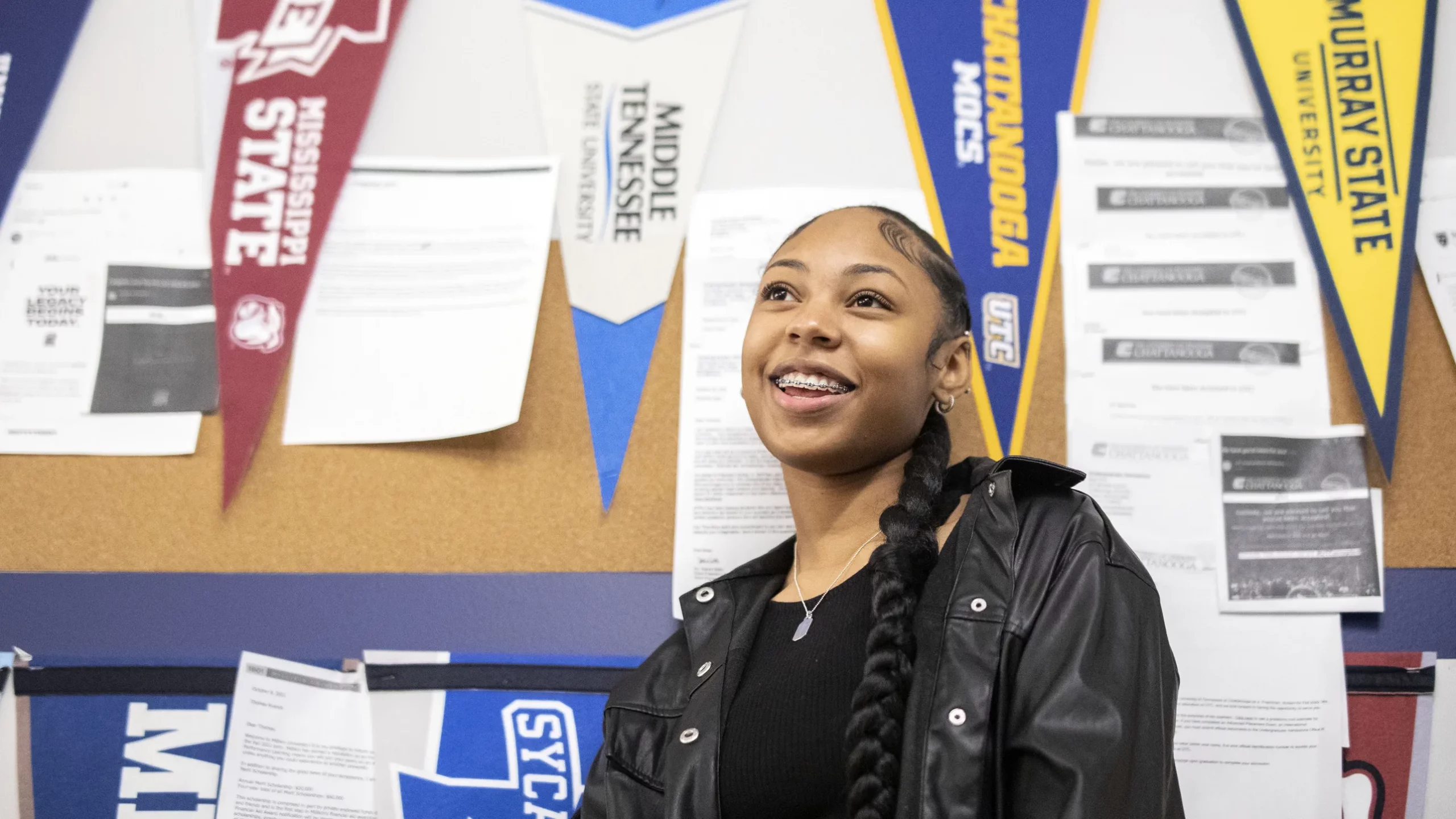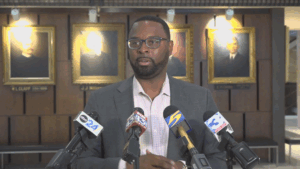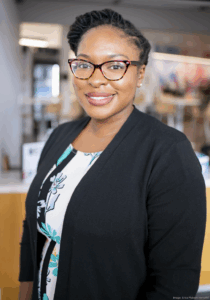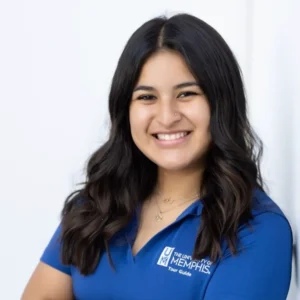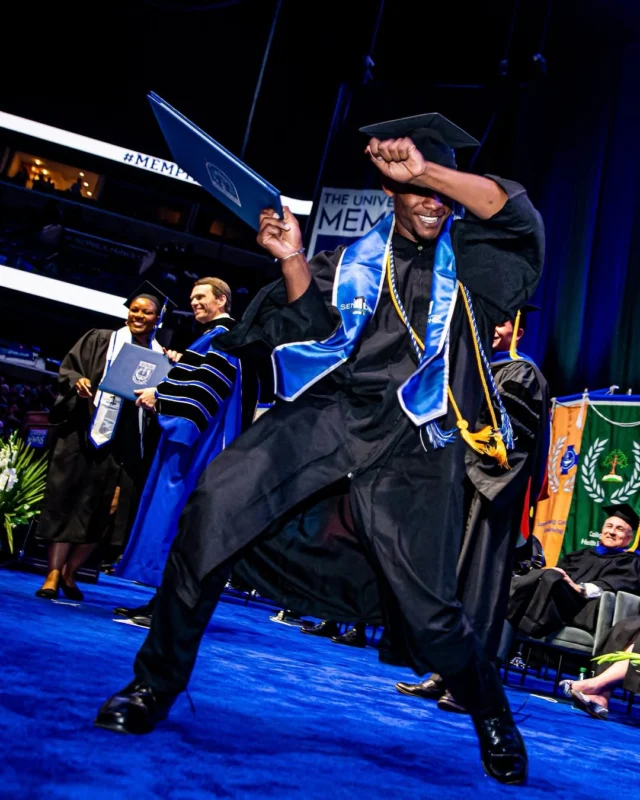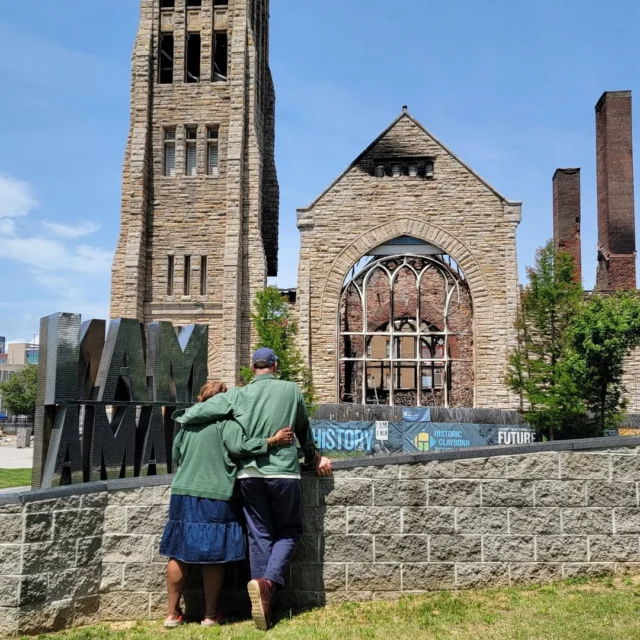Before Winter Shields was born, she faced an uphill climb to success — academically and otherwise.
When Shields’ mother, Nastassja Miller, was pregnant, doctors said her daughter was sickly, and could be born with Down syndrome or be developmentally delayed. While the doctors were wrong about that, at 6 months old, Shields needed her left kidney removed. And then, when Shields was 2 years old, her father was incarcerated, leaving Miller to raise Shields on her own for over a decade.

Despite all those challenges, Shields, now a senior at Crosstown High School in Memphis, is in the top 20 in her graduating class – with four years of straight As – and on her way to college.
Shields’ achievements are part of a greater trend in Memphis: Over the last four years, Black girls have graduated from high school at a higher rate in Memphis-Shelby County Schools than any other demographic group on record, a reversal of traditional academic disparities where Black students lag behind their white peers.
Supportive classrooms and attentive teachers of color who can relate to their students are certainly a large part of the equation to Black girls’ academic success. But Memphis-Shelby County Schools graduates and soon-to-be graduates agree that behind the trend is a personal determination to excel in spite of the double burden of racism and sexism that Black girls often face.
Limited studies of Black girls are more likely to ‘problematize’ than promote
It’s hard to say for certain what’s behind Black girls’ high graduation rates in Memphis, experts say, as their academic outcomes are chronically understudied in comparison to other demographics.
A U.S. Department of Education spokesperson said the department does not collect high school graduation rate data disaggregated by race and sex, though a National Center for Education Statistics table provides graduation data for the U.S. and Tennessee by race/ethnicity. Generally, though, girls graduate from high school at higher rates than boys.
National studies and statistics more often “problematize” rather than promote Black girls in K-12 schools, focusing on topics like the school-to-prison pipeline, hair or aesthetic bias, or disproportionate rates of suspension, drop-out, or teen pregnancy, said Danielle Apugo, an assistant professor of education at Virginia Commonwealth University and co-editor of the book “Strong Black Girls: Reclaiming Schools in Their Own Image.”
“Black girls and Black girlhood are lumped into categories with Black males and Black women, which flattens the dynamism of our experiences in K-12,” said Apugo, whose studies focus on the educational experiences, culture, resistance, and intellectual uprising of Black women and girls in the United States.
emphasize it as much because of how there’s so much violence toward and against Black boys, so parents are naturally talking to them about their sense of self and identity and being careful.”
For Shields, the strong female role models in her life have helped her get to where she is today — recently accepted into 30 colleges, including the University of Mississippi’s pharmacy program, a great feat for an incoming college freshman, and the recipient of five full-ride scholarship offers.
“I know it means so much to my mom. She’s always really proud of my grades,” Shields said. “Actually, after I get good grades and now that I’m getting into college, just to see her reaction … it’s like she’s more happy and excited than even I am.”
She isn’t quite sure where she’ll attend college or what she’ll study — maybe something in the medical field, like pharmacy. But above all else, Shields knows she wants to be a leader, following the example of other powerful Black women in her life.
Like her grandmother, who is director of the drug rehabilitation program at the Salvation Army in Memphis. And her mother, who was a single parent for most of Shields’ life, until her father was released from prison when Shields was in eighth grade.
Miller also juggled a full-time day job with studying at night. When Shields was 10, Miller graduated with a master’s degree, and now is an officer in the Shelby County Health Department’s COVID unit.
“I’ve always told her to never give up, that it’s never too late to go to school or get help, and you have to have goals in life to be successful,” Miller said. “I think she’s a reflection of that, and us, wanting to succeed and having goals and reaching them.”
Black girls often learn to navigate racialized spaces — school included — by observing how Black women in their own lives navigate them, from informal spaces such as a grocery store to formal environments such as work or school, Adams-Bass said. Having Black women teachers who “mirror” Black girls and show them what’s possible, may move the academic needle for Black girls.
on track, and pushing students of color to participate in Advanced Placement and dual enrollment classes, among others. But administrators couldn’t say what has caused Black girls in particular to graduate at the highest rates in Memphis-Shelby County Schools, compared to all other demographic groups.
Black girls’ own drive and resilience push them to success
Shields credits all her schools and teachers for the academic excellence she has demonstrated from kindergarten through 12th grade. Her elementary school, Idlewild Elementary, gave Shields a solid foundation, and at Crosstown she participated in numerous AP classes and dual credit classes through her school’s partnership with Christian Brothers University.
But Shields’ success is about more than that. Behind the classes and the grades, Shields had her own personal drive and resilience — in large part, she said, inspired by her mother and grandmother’s examples and encouragement.
Even if Shields had to be out of school for doctor’s appointments or health issues, her mom — a strong woman who inspires Shields daily — would remind her that school should be her top priority.
So, that’s what Shields has always done: If she had to miss class for an appointment, which has happened frequently throughout her school career, she asked her teachers for schoolwork ahead of time and completed it. If she was struggling with a concept, she got tutoring and asked for help.
“She (my mom) was always making sure I knew that tutoring doesn’t mean you’re not smart or something like that. Tutoring could just mean that you need help, and you don’t have to be scared to take tutoring classes,” Shields said. “I’ve learned to keep an open mind if you need help; don’t be scared to ask for help.”

School didn’t always come easily for Destinee Woods, either. Woods, a 2021 graduate of Memphis-Shelby County Schools’ Bolton High School, has always struggled with math and science.
“With math, if there’s a formula or graph it was something I wasn’t good at it,” Woods said with a laugh. “And science has never been my thing.”
But she never let it stop her. Motivated by her grandparents, who never had the opportunity to go to college, and her parents, who were first-generation college students themselves, Woods worked hard to keep her grades up and take challenging AP and dual enrollment classes so that she could not only attend college but earn scholarships to help pay for it.
Woods’ hard work and determination paid off. Not only did she graduate from Bolton with a strong grade point average of 3.7, but Woods also managed to start her own hair business while still in high school, and was involved in numerous extracurricular activities like National Honor Society and Beta Club, a national nonprofit educational youth organization dedicated to helping children become leaders.
As a result, Woods was accepted into 22 colleges and universities, but landed on Miles College, a private historically Black liberal arts college in Fairfield, Alabama, where she earned a full-ride scholarship.
Woods is quick to admit that college isn’t easy. But nevertheless, she continues working toward her dream of someday owning her own salon.
“I still struggle with science,” Woods said. “So I just take more time to study and ask for help when I need it. It’s that simple.”
Like Woods, Shields has had to overcome numerous hurdles over the years. Still, Miller knew the day would come when Shields would don a cap and down and cross the stage to receive her diploma. And while Shields’ graduation is still months away, her mother is sure the day will be emotional.
Miller is more proud of her daughter than she could’ve imagined.
“I was prepared for whatever the wind blew in,” Miller said, reflecting on the doctor’s warning during her pregnancy that Shields might be developmentally delayed or have Down syndrome. She weathered all the worries about her daughter’s health, the medical appointments that took Shields out of school and, on top of it all, the stress of being a single mother until she remarried in 2019.
Now, Miller sees it’s all been worth it.
“It’s been like a marathon,” she said, her voice thick with tears. “But I’m so proud of my baby.”
This article was originally published at “chalkbeat.org”
You might also be interested in: Memphis Ambassadors Program – Became a Memphis ambassador
